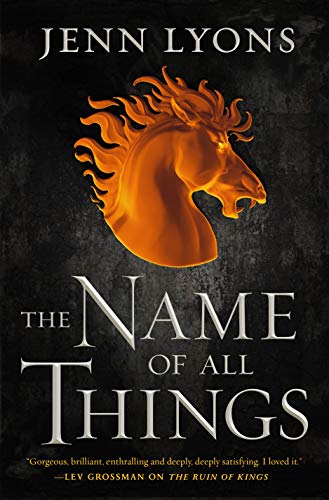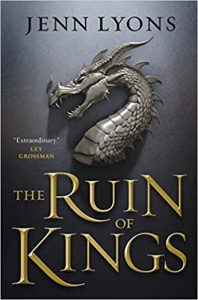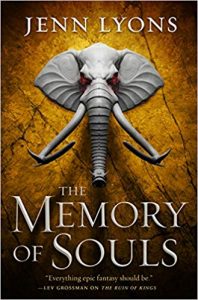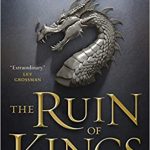 The Name of All Things (A Chorus of Dragons, #2) by Jenn Lyons
The Name of All Things (A Chorus of Dragons, #2) by Jenn Lyons Format: audiobook, eARC, hardcover
Source: publisher, purchased from Audible, supplied by publisher via Edelweiss
Formats available: hardcover, paperback, ebook, audiobook
Genres: epic fantasy, fantasy
Series: Chorus of Dragons #2
Pages: 589
Published by Tor Books on October 29, 2019
Purchasing Info: Author's Website, Publisher's Website, Amazon, Barnes & Noble, Kobo, Bookshop.org
Goodreads
You can have everything you want if you sacrifice everything you believe.
Kihrin D'Mon is a wanted man.
Since he destroyed the Stone of Shackles and set demons free across Quur, he has been on the run from the wrath of an entire empire. His attempt to escape brings him into the path of Janel Theranon, a mysterious Joratese woman who claims to know Kihrin.
Janel's plea for help pits Kihrin against all manner of dangers: a secret rebellion, a dragon capable of destroying an entire city, and Kihrin's old enemy, the wizard Relos Var.
Janel believes that Relos Var possesses one of the most powerful artifacts in the world―the Cornerstone called the Name of All Things. And if Janel is right, then there may be nothing in the world that can stop Relos Var from getting what he wants.
And what he wants is Kihrin D'Mon.
Jenn Lyons continues the Chorus of Dragons series with The Name of All Things, the epic sequel to The Ruin of Kings.
My Review:
This is going to be one of those times when I talk around the book as much as I talk about the book. Because this is one hell of a story – one that is still rolling around uneasily in my head – and it’s not done yet. Either the story or in my head.
And I’ll probably say this multiple times in the course of this review, but I want the third book in the trilogy, The Memory of Souls, now. RIGHT NOW. It’s due out in August and that’s just not soon enough. Not nearly.
 This series began early in 2019 with The Ruin of Kings. Which was awesome and marvelous and terrific and The Name of All Things is actually better – something that is seldom said either about a sequel or about book two in a trilogy. This is a middle book that does not SUFFER from middle-book syndrome. More like it revels in the parts of that syndrome that it bothers to deal with.
This series began early in 2019 with The Ruin of Kings. Which was awesome and marvelous and terrific and The Name of All Things is actually better – something that is seldom said either about a sequel or about book two in a trilogy. This is a middle book that does not SUFFER from middle-book syndrome. More like it revels in the parts of that syndrome that it bothers to deal with.
The Ruin of Kings was a sword. The Name of All Things is a stone. I suspect that the Memory of All Things will also turn out to be a stone – but I wouldn’t bet my own money on that.
This is a twisty story where nothing is as it seems. And while it seamlessly blends a whole bunch of elements that shouldn’t be within spitting distance of each other, the resulting wild ride holds the reader’s attention marvelously – and possibly also props the reader’s eyeballs wide open long after they should be closed.
(I couldn’t bear to wait to finish this and spent five hours listening, still wasn’t done and carried the hardcover to bed. I never read hardcovers anymore but I couldn’t stop.)
Like the previous book, The Ruin of Kings, this is an experiment in voice. The way it is told is almost as important as what is being told. The first book was Kihrin’s story, but we’ve already heard Kihrin’s story. This one is Janel’s story, and it takes place simultaneously with that first book. (That’s a huge hint that you need to read both and in order.) But it also takes place three days after the end of that first book as the sometimes hilarious but always trenchant chapter titles make clear.
Kihrin and Janel have finally met, as they are fated to in all sorts of demonic prophecies, and Janel is telling Kihrin and her assembled company of heroes, followers, betrayers and hangers on just what happened to her. But Janel is not the only one telling that story, her narrative alternates with that of her friend, the healer priest Brother Qown. Off in the background, the story is framed by a third party and participant in these events, the mage Senera. She is reporting the story to her master Relos Var. Who may be the villain of the entire piece. Or may in fact be the actual hero. He certainly thinks he is. But then, many villains do.
So the story being told within the story being told makes this an excellent choice for audio, especially as the three in-story narrators are voiced by three different voice actors.
But the story itself is an epic about gods and monsters. Except that neither are exactly that.
The gods in this story, or rather the exceedingly powerful beings who are worshiped as gods, aren’t really gods. (That this parallels the Elven Gods in the world of Dragon Age was rather a surprise.)
At the same time, this is also the story of what appears to be a very long con. Those so-called gods are conning their worshipers into treating them as gods, yes. But they are also doing their best to keep the monster who used to be one of them chained. And failing. Over and over and over again. They may be doing the right thing – or at least the best thing they can under the circumstances. Or they may just be preserving the status quo.
Relos Var wants to tear it all down and start over. He’s trying to set up something like Ragnarok, because he seems to think the best answer is to finally have that ultimate battle and deal with the consequences. He may be right. Or it may just be a very long two-person grift like American Gods. We just don’t know – yet.
But at this point in the story, Relos Var’s help keeps coming at just too high a price. Whether the result is triumph or his head on pike for everyone to wave at is still up in the air. (And that’s a reference from Babylon 5 because Relos Var really, really reminds me of Morden, which means he’s working for the Shadows of ultimate Chaos. Which is entirely possible.)
And in the middle of all of this, we have Janel’s story of her country of Jorat, a place whose social mores and politics are absolutely fascinating, more than a bit subversive, and worthy of an epic all of their own. It’s also the story of someone who thinks they are, or at least can be, the one who is running all the games, only to discover at the end that they are probably one of the suckers who bought the con.
In the end, well, it isn’t the end. This chapter of the story concludes, but the story itself is far from over. And this reader at least didn’t want it to be. I just wanted the next book. Immediately if not sooner.
Escape Rating A++: OK this is the first time I’m officially using this rating. The Name of All Things is epically epic in all the best ways. It’s so good that I added it to my Best of 2019 post even though I was only halfway through at the time. I already knew it was just that damn good. It’s everything that epic fantasy is supposed to be; rich, lush, decadent, other-worldly, beautiful, strange, corrupt and compelling, all at the same time.
This was a rare book where, while I mostly listened to it, I also read the ebook and the hardcover as appropriate. Or necessary. Like at the end where I had 1.5 hours left of listening but under half an hour if I just read the damn thing. Patience is not one of my virtues.
That being said, if you have the time and the inclination, the audio of this is marvelous. Partly that’s because of the way that the story is told, and partly that’s because the voice actors are just that damn good. This is also a rare case where I have to admit that if you run out of time or patience, get the book in print and not ebook. Senera’s commentary in her framing report of the story is footnoted. In audio her comments are inserted as asides. In print, they are footnotes at the bottom of the page. In ebook, they are footnotes at the end of each chapter. Flipping back and forth to the chapter end just to get her commentary is worth it but ANNOYING.
However you get to it, one of the things that is absolutely marvelous in this story is the social commentary that is an integral part of the way that things work in Janel’s country, Jorat. While there’s a whole lot of fascinating stuff about the way that pretty much everything was developed around intelligent “horse” herds and their behavior, what makes it all sing is the separation of sexuality and gender roles. So much of what happens to Janel, and has happened to her, is rooted in the fact that she while she may physically be female, she is a stallion – a leader of the herd. That she is a woman and that she is a leader are not contradictory – although some people want it to be. Women can be stallions, and men can be mares. And it’s completely separate from what genitalia they have as well as utterly separate from what genitalia they prefer for their sexual partners. It’s political and it’s baked into the culture, as are the concepts of edora and thudaje, whether someone is the ruler or the ruled, how that is determined – and how that can be changed.
 One of the other things that makes this series so mesmerizing is that it is never a simple contest of good vs. evil. Everything in this world is in shades of gray. The gods are not really gods. However, the demons, for the most part, at least so far, seem to really be demonic. But the characters who commit evil acts, like Relos Var and Senera, may have the best of motives. And may still be evil at the same time. Nothing is clear but everything is compelling.
One of the other things that makes this series so mesmerizing is that it is never a simple contest of good vs. evil. Everything in this world is in shades of gray. The gods are not really gods. However, the demons, for the most part, at least so far, seem to really be demonic. But the characters who commit evil acts, like Relos Var and Senera, may have the best of motives. And may still be evil at the same time. Nothing is clear but everything is compelling.
And I’m compelled. The Memory of Souls can’t come out fast enough.



















Glad you’re enjoying this series!!
Ali @ Our Book Boyfriends recently posted..#IMWAYR ~ 1/13/20
Hi, thanks for sharing your insight and recommendations about this novel. What would you advise for aspiring writers who are in trouble creating a good impactful approach in their story? I’d appreciate the advice. Thanks!